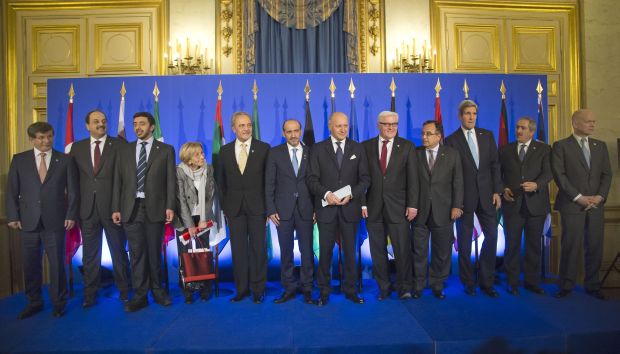
Foreign Ministers from the Friends of Syria group pose for a group photo prior to a joint press conference at the foreign ministry in Paris, Sunday, Jan. 12, 2014. (AP Photo/Michel Euler)
In a bid to reassure the Syrian opposition, it also said that Syrian President Bashar Al-Assad would have no role in a future Syria.
“Once the a transitional governing body is established, with control over all governmental institutions . . . including the armed forces, security services and intelligence structures, Assad and his close associates with blood on their hands will have no role in Syria,” said the statement.
It added: “All those who committed war crimes or crimes against humanity must be held accountable.”
The group, a diplomatic alliance of mainly Western and Gulf countries opposed to President Assad, said it would consider any plans by the Syrian government to hold presidential elections in which he would participate as “null and void,” adding that it would contradict the Geneva II process and its goal of a negotiated democratic transition. “Such a parody of a ballot, aimed at maintaining in power a man whom the UN considers committed war crimes and crimes against humanity, would only fuel the conflict and increase the threat of a partition of the country,” it said.
Diplomatic sources in Paris said that during the meeting on Sunday all participants agreed on the necessity of the Geneva II meetings, and on the need to provide a suitable climate to allow the Syrian National Coalition to attend the conference.
The group urged the Coalition “to form, as soon as possible, a delegation of opposition forces to participate in the political process starting on January 22.”
However the Coalition, made up of opposition groups based in Istanbul, is yet to decide on whether to accept UN Secretary-General Ban Ki-moon’s invitation to attend Geneva II.
Sources close to the Coalition’s chairman Ahmed Al-Jarba said: “A number of meetings with field commanders [from opposition and rebel groups] will be held in the next few days, before January 17, when the Coalition is due to make a decision on participation [in the Geneva II meetings] . . . without causing division between the delegation and the field commanders.”
The Coalition has had difficulty in unifying rebel groups on the ground in Syria.
Jarba said he represented the “Syrian people’s fears and their demands, and explained the facts on the ground,” in reference to the Coalition’s stated preconditions for attending Geneva II.
He added: “The removal of Bashar Al-Assad from the picture of Syria’s future has entered the decisive stage.”
Russian Foreign Minister Sergey Lavrov held a meeting with Jarba in Paris on Sunday—the second time the two have met—although no details were disclosed by either party.
The Friends of Syria urged Russia and Assad’s other main backer, Iran, to “use all their influence on the regime” to halt indiscriminate attacks on civilians and allow humanitarian aid workers access to all Syrian territory.
It also condemned “in the strongest terms the atrocities committed on a daily basis by the regime against its own people.”
It demanded the withdrawal of all foreign fighters in Syria, “both those fighting with the regime, such as Hezbollah and other Iranian backed forces, and those fighting within other extremist groups.”
The Paris statement also urged all opposition groups to respect the values of democracy and pluralism, and to recognize the political authority of the Coalition, and to allow humanitarian aid into territory under their control.
It said it fully supported the Free Syrian Army (FSA) and other groups’ fight against the Islamic State of Iraq and Syria (ISIS), which has recently lost ground in Idlib after rebel groups, including a loose coalition of Islamist forces known as the Islamic Front joined forces with the FSA to fight the Al-Qaeda-affiliated group.
“Extremist groups play in favor of the regime,” it said, and “damage the image of the democratic and legitimate Syrian opposition forces, and deprive them of local and international sympathy and support.”
